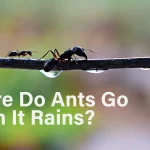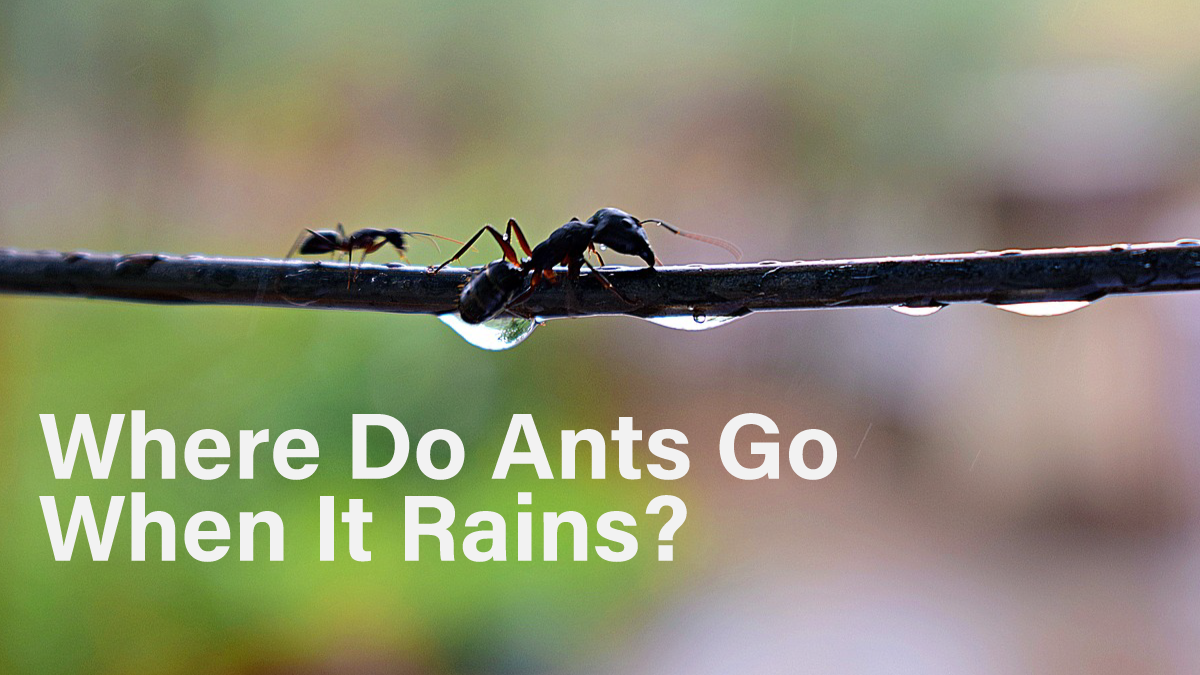Ants are tiny and tiny creatures; one can think about how difficult it would be for ants to survive rain, snow, and other critical weather conditions. During summers, we see a lot of ants roaming around the home, and at times they become very annoying because they chew food habits. And at that time, people often wonder where ants go when it rains. Though the answer to this frequently asked question is not so complicated, very simple ants hibernate inside their nests, inside human homes, and even beneath the soil in rainy season or critical weather conditions.
Ants do not hibernate in summer but only make arrangements for the rainy season in summer. They collect extra food to save and gather the things to make solid and heavy sheets that could protect them against rain and cold weather. To avoid the heavy effects of rain on the nests created by ants, they make a fortress over the head of the nest and a defense made up of sand which absorbs maximum water and does not go inside the nest. Thus, during heavy rain storms, ants build tunnels inside the nest, which are very tinny and small and allow all the water to flow out of the nest through those tunnels rather than accumulating in the nest.
Where Do Ants Go When It Rains?
People annoyed by ants during summer are keen to know where ants go when it rains. Well, ants do not go anywhere in winter or rainy seasons, but they hibernate and keep themselves safe from the cold effects of the weather, which they are unable to bear if they still roam freely in rainy or cold weather. Though, in the rain, ants take extra precautions as water may let their nest flow away or cause ant colonies to get affected badly. That is why ants prepare themselves properly before the arrival of the rainy weather or winter season. Ants collect food and store it for such cold weather when they may not be able to go outside and will stay in their nests. Moreover, ants make their nests solid and tall to avoid rain off the perch, which keeps water away from the nest and makes tunnels inside water accumulation.
Ants Behaviour Before Rain
There are different opinions regarding ants’ understanding or predicting the arrival of the rainy season before time. Those who are constantly in contact with studies related to ants and have discovered many facts about the nature of the ants can now know that ants make pre-arrangements before the arrival of the rainy season. They store a lot of food in their nests so that they may not need to move out in search of food when there is water outside due to rain. Moreover, ants put a lot of effort into making themselves more robust so that rain could not affect them quickly, and they also close all the minors or the nest to avoid the entrance of water into their homes.
When ants make such arrangements before the arrival of the rainy season, it lets people think that maybe ants can smell that the rainy season is about to start, but this is not the case. Ants are not sensing the coming of the rainy season. Instead, they get used to natural signs. They can understand from the timings of the days and nights that when nights are getting longer and days are getting short, it’s time for the rain to fall. This lets them be aware of the coming of the rainy season, and that’s why ants prepare themselves beforehand to avoid getting affected by the rainy season.
In contrast, ants not only take measures to protect their nests from homes, but if they feel that their nests are not strong enough to save them from the rains, then they start to hibernate in human homes and begin to ad the place where they can feel warm and secure for the entire rainy season. Ant’s body temperature also makes them aware that winter and rainy weather cause their body temperature ALS to fall, which is a significant indication for them that it’s time to hibernate rather than move around in search of food. They begin to increase their food intake before winter, and during cold weather, they try to make their body warm and heated as much as they can.
Can Ants Predict Rain?
The nature of ants is that their body temperature starts to fall as the temperature outside starts to fall. So this is an active indication for them that the cold and rainy season has begun. As already discussed above, ants make huge arrangements before the arrival of the rainy season, and they start storing food either in their body by increasing food intake or by storing food in the nests so that they may eat them afterward when they may not be able to get out of the nests.
Studying nature alerts lets people understand in more detail that ants do not smell the coming of the rainy season. Instead, they look up to the signs of nature, which indicate that rainy or cold weather is about to arrive. Signs such as shorter days, longer nights, and falling temperatures are the leading indicators that help in predicting rain for ants. Predicting the rain before time is essential for ants because they can not afford to enter the rainy season without making necessary arrangements beforehand. Hence, if they join without pre-arrangements, they stake theirs or even lose them.
Though ants can manage to walk on the upper face of the water, this is because their weight is too light, which gives them this beneficial opportunity to survive even on the water by just walking on the upper surface. Thus, this is still risky for them because they may not know when the pressure of water increases from the front or back and push them with it. So, proper preparation is required for ants, which involves hibernating in nests or human homes. That is why ants need to predict the arrival of the rainy season and make up their minds and body to work accordingly.
Can Ants Hibernate?
Yes, ants do hibernate, but this does not mean that the hibernation process is limited to the nest or human’s home. Instead, there are a lot of ways or places where ants can hibernate and save themselves from the cold or rainy seasons. At first, ants hibernate in their nests to survive the cold season, where they store excessive food so that they may not need to go out in search of food. Moreover, when ants feel that their nests are not safe enough to live in, they start to move to human houses, where they find out places that are warm and where they can not be disturbed by people.
Likewise, to make their bodies warm and heated, ants sometimes burry themselves in the soil for the cold season to avoid low temperatures. This often happens when the body temperature of ants also falls in winter, and they need to warm their bodies. In such circumstances, ants fill up their stomachs with excess themselves under the soil to remain warm.
In contrast, when ants hibernate in their nests, they make two things, one is a fortress, and the other one is a tunnel. A defense is a protection made up of sand, and ants make a fortress on the head of their nests so that when rain falls, that sand pack absorbs all the water and does not let the water enter their nests. Though during heavy showers, there are still chances of rain entering the nest, such purpose ants make tunnels in their nests. These are short and small holes that do not let the water accumulate in the nest, instead will allow the water to run out of the nests properly without affecting the living of the ants.
At What Temperature Do Ants Hibernate?
Ants hibernate due to two main reasons, one is rain, and the other is cold weather. These two are the times when ants feel insecure and they need to hibernate. During the winter, the body temperature of the ants starts to fall, due to which their survival in the cold weather becomes challenging, and they need some hot and warm surroundings, which begin to hibernate in their nests, in human homes or underneath the soil in severely cold weather.
Hibernating is not an easy task for ants; before getting themselves closed in their places, ants need to gather a lot of food for themselves, which is a task they carry out mostly in summer when they collect the excess food and store that food for winter and rainy seasons. They also gather things to build up solid and long shelters; they extend their protection which is nest to remain safe from the heavy rain specifically. Ants make fortresses and tunnel nests made up of sand and absorb rain. Inside the nests, they create tiny tunnels which let the water move out of the nest rather than accumulate inside.
Moreover, in severely cold weather, ants hibernate under the soil where they can’t bring food along, so they fill their stomachs with excessive food and stay indoors to remain heated and warm. Ants also hibernate inside the human in search of food and friendly surroundings. Though, in summer, you may get the chance to see a lot of ants moving around your house because, in summer, ants avoid remaining in their nests but make preparations for the winter and rainy seasons by collecting food and shelter in summer.
FAQs
Where do ants go when it rains?

Ants hibernate in their nests or inside human homes to stay safe and warm.
How do ants Hibernate?
Ants can hibernate in their nests, inside your homes, or can also hibernate themselves underneath the soil.
Do Ants Hibernate in summer?
No, ants roam freely outside during the summer season.
Do ants predict rain?
Yes, ants can predict rain by understanding the signs of nature, which include shorter days, longer nights, and falling temperatures.
Can ants smell the rain?
No, ants can not smell the rain. Instead, they can predict rain through natural signs.
Conclusion
The topic under discussion is where ants go when it rains. Well, the article above explains the issue in very detail and consensus way that after completing your reading of this article, you will be able to answer this question in complete depth with some factual knowledge as well. Though to be precise, the article above states that ants can predict the arrival of cold and rainy seasons through natural signs, which include; the shortening of days, longer nights, and temperatures getting low day by day. To manage these critical weather conditions, ants make pre-arrangements and collect food and shelter all in summer to avoid meeting any form of harmful side effects which comes with the rainy season for ants.
